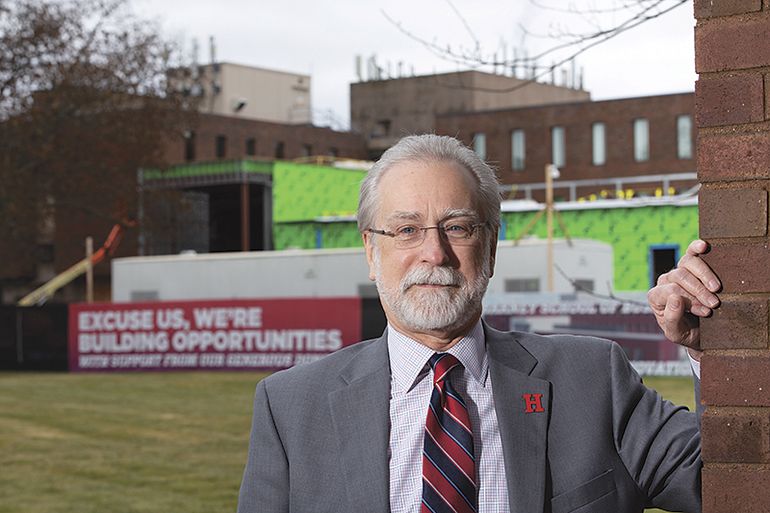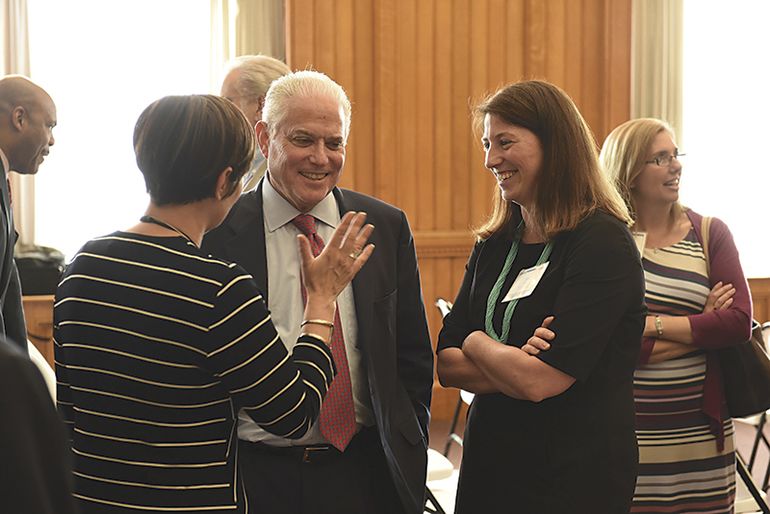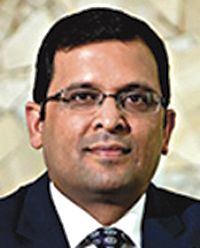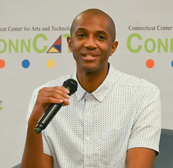Processing Your Payment
Please do not leave this page until complete. This can take a few moments.
- News
-
Editions
View Digital Editions
Biweekly Issues
- April 29, 2024
- April 15, 2024
- April 1, 2024
- March 18, 2024
- March 4, 2024
- February 19, 2024
- February 5, 2024
- January 22, 2024
- January 8, 2024
- + More
Special Editions
- Lists
- Viewpoints
- HBJ Events
- Business Calendar
- Custom Content
CT private colleges want parity in state's degree program approval process
 HBJ Photo | Steve Laschever
University of Hartford Provost H. Frederick Sweitzer says delays in the state approval process held up at least one new program the school introduced.
HBJ Photo | Steve Laschever
University of Hartford Provost H. Frederick Sweitzer says delays in the state approval process held up at least one new program the school introduced.
 Photo | Contributed
CT Conference of Independent Colleges President Jennifer Widness (right) has helped private schools gain a limited exemption from state program approval oversight.
Photo | Contributed
CT Conference of Independent Colleges President Jennifer Widness (right) has helped private schools gain a limited exemption from state program approval oversight.
 Rupendra Paliwal, Provost, Sacred Heart University
Rupendra Paliwal, Provost, Sacred Heart University
 Dan May, Provost, University of New Haven
Dan May, Provost, University of New Haven
Introducing new programs at college campuses in Connecticut has become a major competitive issue.
As schools battle for what's expected to be a shrinking student population, the need to develop new degree programs that adapt to a rapidly changing job market is paramount.
That pressure has forced a legislative battle in recent years by the state's private, nonprofit colleges, which say they have been put at a competitive disadvantage by a regulatory approval process that doesn't apply to their public university counterparts, or to online or private schools in nearby states.
Specifically, many Connecticut private schools have historically been required to get new programs approved by the state Office of Higher Education (OHE), which administrators say can add upwards of six months to an already prolonged process.
Temporary measures passed in the state legislature have given some private schools a limited exemption from the law, but the industry is pushing for a long-term fix that puts them on an equal playing field.
“Many of our state-based competitors don't have to do this, which has never made sense to me,” said H. Frederick Sweitzer, provost at the University of Hartford.
Prior to 2013, the state required OHE program approval for every college, public and private. But lawmakers that year passed a law that did two things: streamline the approval process so that it takes only 45 days, and remove public colleges from OHE's program-approval purview.
Two years later, the legislature approved a bill that would have also exempted private schools from the added oversight, but it was vetoed by Gov. Dannel P. Malloy who cited discomfort in relaxing the regulations.
“Parents and students should be assured that the programs offered meet Connecticut's rigorous standards for academic quality,” Malloy wrote in a June 2015 veto statement.
Since then, private colleges have successfully lobbied for a temporary exemption that caps at 12 the number of new programs the schools can introduce without state approval. The two-year exemption, which has already been extended once, expires in 2020, and the industry is looking for a permanent fix.
The exemption covers private, nonprofit colleges that are based in Connecticut, have operated in the state for at least 10 years, and are eligible to accept federal financial aid, among other requirements.
Four private schools — Yale University, Wesleyan University, Trinity College and Connecticut College — are permanently exempt from the OHE approval process because their charters predate OHE oversight, officials said.
Jennifer Widness, president of the Connecticut Conference of Independent Colleges, said the issue isn't necessarily an emergency for private schools, but with in-demand skills changing rapidly as new technologies emerge — like artificial intelligence, blockchain, etc. — it's something legislators should take into consideration.
“All of these different skill sets that are needed … , they didn't even exist five years ago,” Widness said. “And so, schools need to adjust accordingly, and their programs need to reflect that.”
Noble intention
Sean Seepersad, OHE's associate director, said he hasn't received any complaints from colleges about the 12-program cap. Further, the approval process prevents colleges from offering expensive programs of questionable quality, he said.
“Like any other state regulatory agency, our process here is to ensure students get the best educational opportunities that they can,” Seepersad said. “We have regulations in place that institutions are supposed to meet, and our goal is consumer protection.”
That's a noble intention, said Chris Bruhl, president and chief executive of the Business Council of Fairfield County, but the problem lies in the execution.
Schools bound to the state's regulatory process are by and large well-established institutions that have rigorous internal approval processes, and are already accountable to regional accreditors like the New England Association of Schools and Colleges (NEASC), said Bruhl, who is also a member of the state-sanctioned Planning Commission for Higher Education, and whose organization includes public and private colleges as members.
Despite the credibility these schools carry, Bruhl said, they can be hamstrung by the approval process.
“The intent — protection of students — … should still be honored,” Bruhl said. “(But the system) impedes the ability of our colleges to compete with online learning and with other well-marketed, reputable institutions.”
Months-long process
Introducing a new program at the University of Hartford takes about nine months, requiring input from industry experts and approvals from department heads and the school's board, said Sweitzer, the university's provost. And while the state process is supposed to take only 45 days, it often stretches north of six months, he said.
The wait time can imperil a program's early success, Sweitzer said. In order to enroll enough students into a new program to financially justify it, school officials need to start advertising and recruiting months before fall or winter courses begin. However, schools can't advertise a program until it's approved by the state.
The University of Hartford in 2016 added a master of science in management program, before the limited exemption was in effect, but the state approval process took nine months, which was longer than Sweitzer expected. The delay caused the university to miss a crucial window for advertising, he said.
“We are delaying filling a need in the community, and we're delaying an income stream, and I don't know why we would do that,” Sweitzer said.
Sacred Heart University hasn't introduced 12 programs in a single year since exemptions were put in place, said Rupendra Paliwal, the university's provost.
In addition to the pressure of competing with an increasing number of online programs offered by institutions operating out of state with lower regulatory hurdles, Paliwal said, Sacred Heart competes for out-of-state students from surrounding New England states and New York.
“As a state we are actually going to lose the talent and revenue brought from out of state into Connecticut,” Paliwal said. “It's a hyper-competitive market.”
The same is true at the University of New Haven, said Provost Dan May. The majority of students there — about 60 percent — hail from out of state, with most of that population coming from Massachusetts, New Jersey, New York and Pennsylvania.
“If (a) New Jersey (school) beats us to the punch on a unique program, it's a problem,” May said.
The Connecticut Business & Industry Association (CBIA) has repeatedly filed testimony with the state legislature in support of measures that taper off state regulation of new private-college programs.
The lobby group has taken an interest in the issue partly because some Connecticut schools' inability to quickly introduce programs that focus on in-demand skills could cost them prospective students, as the state loses out on young, upwardly mobile residents, CBIA CEO and President Joe Brennan said.
“If you look like you're a little bit behind … I definitely can see how that can have a … chilling effect in your ability to attract (students),” Brennan said. “Anything that might hinder you and make you less competitive from a recruitment standpoint is definitely problematic.”
CT's private colleges
These private colleges in Connecticut have traditionally had to get state approval to add new programs, a regulatory burden the industry has been trying to eliminate.
• Albertus Magnus College, New Haven
• Fairfield University
• Goodwin College, East Hartford
• Hartford Seminary
• Holy Apostles College & Seminary, Cromwell
• Mitchell College, New London
• Quinnipiac University, Hamden
• Sacred Heart University, Fairfield
• University of Bridgeport
• University of Hartford, West Hartford
• University of New Haven
• University of St. Joseph, West Hartford
Related Content

2022 Giving Guide
This special edition informs and connects businesses with nonprofit organizations that are aligned with what they care about. Each nonprofit profile provides a crisp snapshot of the organization’s mission, goals, area of service, giving and volunteer opportunities and board leadership.
Learn more
Subscribe
Hartford Business Journal provides the top coverage of news, trends, data, politics and personalities of the area’s business community. Get the news and information you need from the award-winning writers at HBJ. Don’t miss out - subscribe today.
Subscribe
2024 Book of Lists
Delivering Vital Marketplace Content and Context to Senior Decision Makers Throughout Greater Hartford and the State ... All Year Long!
Read Here-
2022 Giving Guide
This special edition informs and connects businesses with nonprofit organizations that are aligned with what they care about. Each nonprofit profile provides a crisp snapshot of the organization’s mission, goals, area of service, giving and volunteer opportunities and board leadership.
-
Subscribe
Hartford Business Journal provides the top coverage of news, trends, data, politics and personalities of the area’s business community. Get the news and information you need from the award-winning writers at HBJ. Don’t miss out - subscribe today.
-
2024 Book of Lists
Delivering Vital Marketplace Content and Context to Senior Decision Makers Throughout Greater Hartford and the State ... All Year Long!
ABOUT
ADVERTISE
NEW ENGLAND BUSINESS MEDIA SITES
No articles left
Get access now
In order to use this feature, we need some information from you. You can also login or register for a free account.
By clicking submit you are agreeing to our cookie usage and Privacy Policy
Already have an account? Login
Already have an account? Login
Want to create an account? Register
Get access now
In order to use this feature, we need some information from you. You can also login or register for a free account.
By clicking submit you are agreeing to our cookie usage and Privacy Policy
Already have an account? Login
Already have an account? Login
Want to create an account? Register










0 Comments